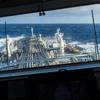More Boat Migrants to Italy Die
Nineteen people died trying to reach Italy on a boat packed with hundreds of migrants, probably poisoned by carbon monoxide fumes from its engines, said the Italian Navy on Saturday, which has rescued more than 4,000 migrants in the last three days.
* Carbon monoxide poisoning likely cause of death
* Sea borne migrants top 70,000 this year, record high
* Calm summer seas prompt recent surge in crossings
Eighteen bodies were found in the hold of the boat, said a navy spokesman, along with three very ill men who were rushed to the Italian island of Lampedusa but one died en route.
The two surviving men were taken by helicopter to a hospital in the Sicilian capital of Palermo, the spokesman said.
He said carbon monoxide fumes produced by the boat's engine likely caused the deaths. A similar incident last month killed 30.
Italy is struggling to keep up with the number of migrant boats this year, which mostly depart from the coast of increasingly unstable Libya, and is seeking more help from the EU in both the rescue mission and in hosting new arrivals.
The United Nations refugee agency (UNHCR) estimates that more than 500 migrants have died in the Mediterranean so far this year, compared to 700 during the whole of last year.
More than 70,000 migrants have been rescued by Italy's "Mare Nostrum" or "Our Sea" mission in 2014, the spokesman said, surpassing the previous record of just over 60,000 for the whole of 2011, when the Arab Spring uprisings fuelled arrivals.
Calmer summer seas have prompted a recent upsurge in boats trying to reach Italy, where immigration centres are overloaded. Interior Minister Angelino Alfano on Saturday said military bases might be temporarily used to house new arrivals.
Italy's navy has been patrolling the waters between Africa and Sicily since October, when 366 people drowned after their boat capsized just a mile from the Italian coast.
That tragedy focused international attention on the desperate risks taken by many migrants, whose plight has been highlighted by human rights groups and Pope Francis.












